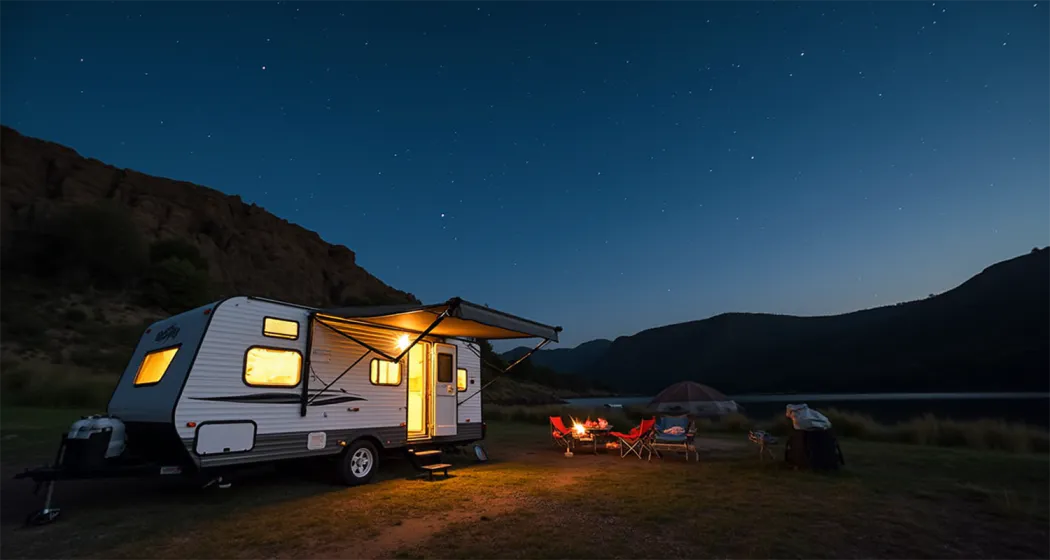
Camping Trailers: The Ultimate 2025 Buying Guide and Tips
Are you dreaming of hitting the road with a camping trailer in tow? Whether you’re a seasoned camper or a first-timer, camping trailers are the ultimate way to explore the great outdoors with comfort and convenience. But with so many models, sizes, and features available in 2025, choosing the perfect trailer can feel overwhelming. Don’t worry we’ve got you covered! In this guide, we’ll dive deep into everything you need to know about camping trailers, from picking the right one for your lifestyle to insider tips that make ownership a breeze. Let’s get started.
What Is a Camping Trailer?
Camping trailers, also known as travel trailers, are towable recreational vehicles designed to provide living accommodations during your outdoor adventures. They vary in size, features, and purpose, catering to everyone from solo travelers to large families.
Popular Types of Camping Trailers
- Pop-Up Trailers: Compact and foldable, great for small cars.
- Teardrop Trailers: Lightweight and perfect for solo campers or couples.
- Travel Trailers: A versatile option with various sizes and amenities.
- Fifth-Wheel Trailers: Spacious and luxurious, requiring a truck with a specialized hitch.
- Off-Road Trailers: Built for rugged terrain and adventurous trips.
Why Choose a Camping Trailer?
- Affordability: Cheaper than motorhomes.
- Flexibility: Detach your trailer and use your vehicle freely.
- Customization: Tailor the interior and features to fit your needs.
How to Choose the Perfect Camping Trailer
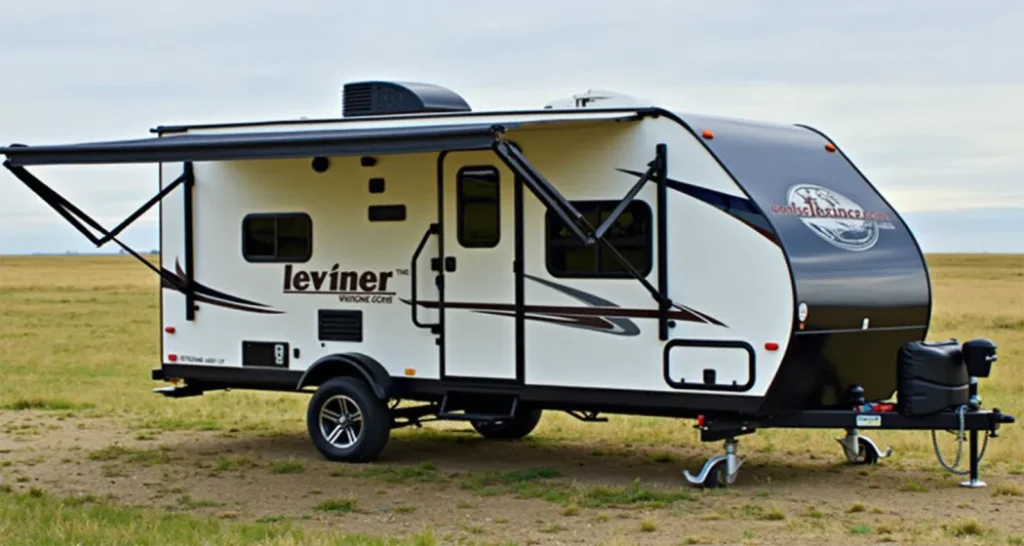
1. Consider Your Budget
Your budget is one of the most important factors when choosing a camping trailer. Prices vary significantly depending on the size, features, and brand, so understanding what you can afford will help narrow down your options.
- Entry-Level Trailers ($10,000–$20,000):
These trailers are typically smaller and more basic, ideal for first-time buyers or those with minimal requirements. They often include essential features such as a small sleeping area, a compact kitchen, and limited storage. While they may lack luxury, they’re practical and affordable for weekend camping trips. - Mid-Range Options ($20,000–$50,000):
Mid-range trailers offer a good balance of price and features. They often include upgraded kitchens with stoves and refrigerators, bathrooms (wet or dry baths), and more spacious sleeping arrangements. They are ideal for small families or couples who want a bit more comfort and convenience on longer trips. - Luxury Models (Above $75,000):
These high-end trailers come equipped with premium materials, advanced technology, and luxurious amenities such as spacious living areas, gourmet kitchens, large bathrooms, and even entertainment systems. They’re perfect for full-time RVers or those seeking the ultimate in comfort and style.
Tip: Always factor in additional costs such as insurance, maintenance, and storage when setting your budget.
2. Assess Your Needs
Identifying your specific requirements is essential for choosing a camping trailer that fits your lifestyle. Consider these key questions to help assess your specific needs:
- Family Size:
Determine how many people will be using the trailer regularly. If you’re traveling with kids, look for bunk bed options or trailers with separate sleeping spaces. Solo travelers or couples can opt for smaller, more compact models. - Travel Style:
Are you planning weekend getaways or extended trips? For short trips, a smaller, more basic trailer might suffice. For longer adventures, prioritize comfort, storage, and advanced features like larger kitchens or entertainment systems. - Tow Vehicle Capacity:
Your tow vehicle plays a critical role in your decision. Check its towing capacity in the owner’s manual or with the manufacturer. Ensure the trailer you choose is compatible with your vehicle’s weight limits, including passengers and gear.
Tip: Consider investing in a weight distribution hitch for added stability during towing, especially for larger trailers.
3. Inspect Features and Layout
A well-thought-out layout and practical features are key to maximizing comfort and functionality in your camping trailer. Here’s what to look for:
- Sleeping Capacity and Bed Sizes:
Ensure the trailer can comfortably accommodate your group. Options range from queen or king beds to bunks and convertible dinettes. Larger families may need multiple sleeping areas. - Kitchen Amenities:
Look for kitchens with a stove, refrigerator, microwave, and sufficient counter space. If you enjoy cooking outdoors, consider trailers with outdoor kitchen setups or grills. - Bathroom Options:
Decide between a wet bath (compact space where the shower, sink, and toilet share the same area) or a dry bath (separate shower and toilet areas). Dry baths offer more convenience but take up more space. - Storage Space:
Adequate storage is essential for gear, clothes, and supplies. Check for overhead cabinets, under-bed compartments, and exterior storage compartments for larger items like camping chairs or bikes. - Special Features:
- Entertainment systems like TVs or Bluetooth speakers for relaxation.
- Climate control features such as air conditioning and heating for all-season comfort.
- Slide-outs to expand living space when parked.
Tip: Walk through several models in person, if possible, to get a sense of the space and layout. Online reviews and video tours are also great resources.
Essential Accessories for Camping Trailers
- Portable Generator: For off-grid camping.
- Solar Panels: Eco-friendly power solution.
- Trailer Hitch Lock: Enhanced security while parked.
- Leveling Blocks: Essential for uneven campsites.
- Awning: Provides shade and extends your outdoor living space.
Top Camping Trailers for 2025
1. Airstream Basecamp 20
The Airstream Basecamp 20 is the perfect blend of lightweight design and iconic style, making it a favorite for solo travelers and couples who crave adventure without compromising comfort.
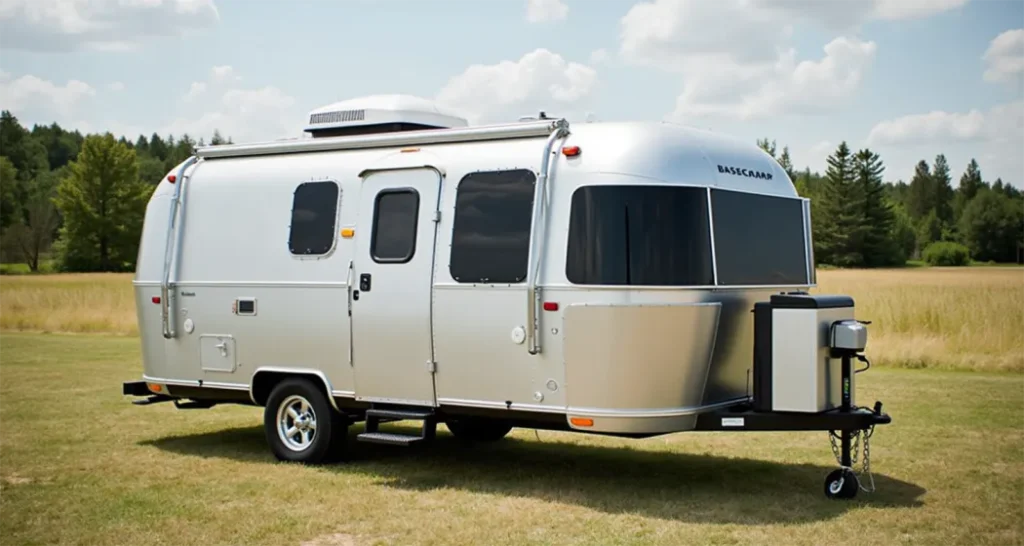
Key Features:
- Lightweight Design: Weighing just under 4,000 pounds, it’s easy to tow with most midsize SUVs.
- Convertible Sleeping Area: The rear seating area transforms into a cozy bed for two, maximizing space efficiency.
- Wet Bath: A compact yet functional bathroom includes a shower, toilet, and sink, ideal for off-grid adventures.
- Durable Build: Constructed with Airstream’s signature aluminum shell, it’s both stylish and weather-resistant.
- Adventure-Ready: Includes features like off-road tires and a built-in bike rack, perfect for active outdoor enthusiasts.
Why Choose It?
The Basecamp 20 is designed for travelers who want a sleek, easy-to-manage trailer that provides essential comforts for both short getaways and extended trips.
2. Forest River Rockwood Geo Pro
The Forest River Rockwood Geo Pro is an eco-friendly camping trailer that’s compact yet packed with modern amenities, making it a fantastic choice for environmentally conscious travelers.
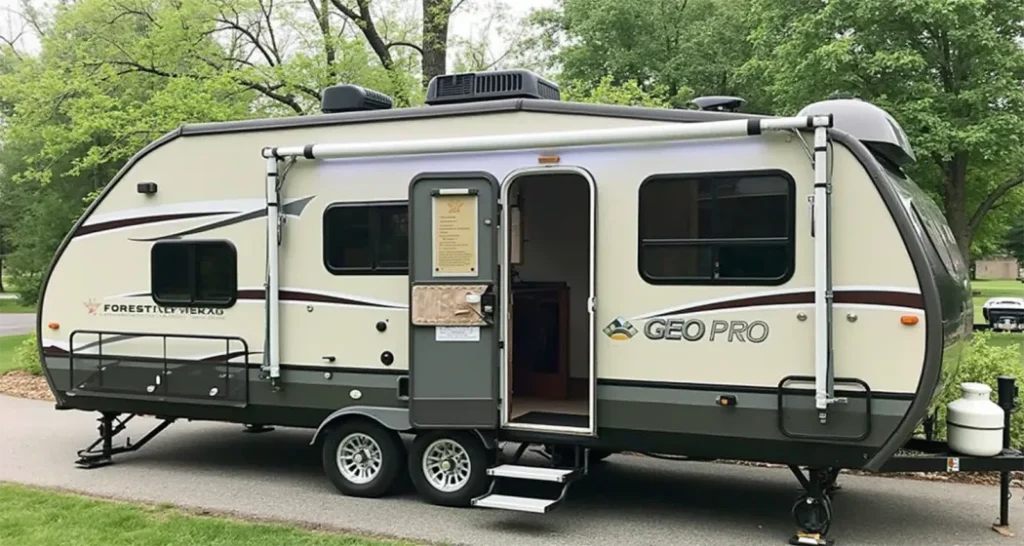
Key Features:
- Solar Panel Compatibility: Equipped with factory-installed solar panels or pre-wiring, enabling sustainable, off-grid power.
- Compact Build: Its lightweight design makes it towable by smaller vehicles without sacrificing features.
- Modern Kitchen: Includes a microwave, stove, and refrigerator for convenient meal prep on the go.
- Entertainment Options: Comes with a flat-screen TV and Bluetooth sound system for relaxation after a day of exploration.
- Versatile Sleeping Arrangements: Offers multiple layouts with bunks, Murphy beds, or traditional beds to fit your specific needs.
Why Choose It?
If you’re looking for a trailer that’s kind to the environment while still offering creature comforts, the Rockwood Geo Pro is an excellent choice.
3. Winnebago Micro Minnie
The Winnebago Micro Minnie is a spacious yet lightweight trailer that caters to families and larger groups without compromising on portability or features.
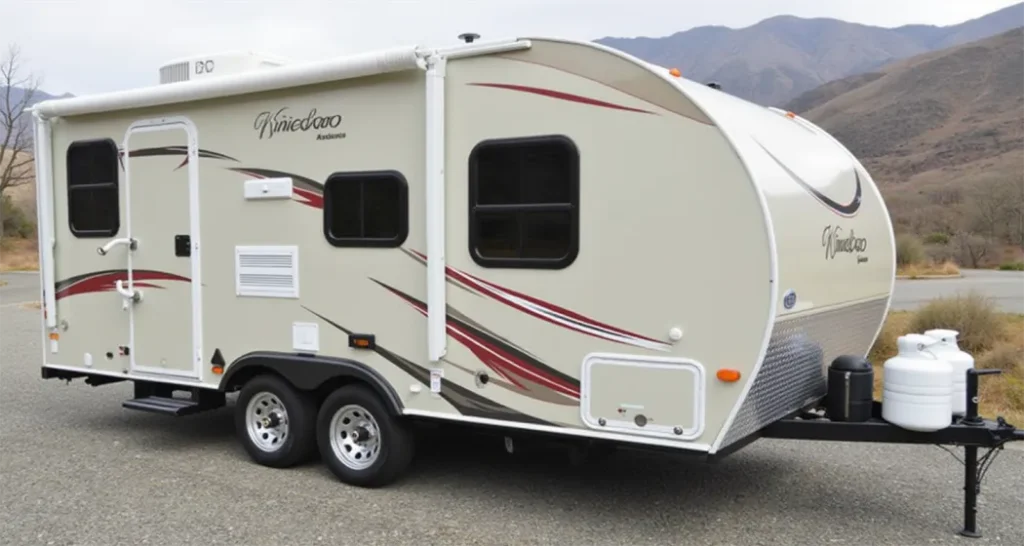
Key Features:
- Lightweight Build: Despite its larger size, it’s towable by many SUVs and light trucks.
- Multiple Layout Options: Offers several floor plans, including bunk beds, queen beds, and convertible dinettes to suit families of all sizes.
- Spacious Interior: Maximized living space includes a roomy kitchen, bathroom, and sleeping areas.
- High-Quality Insulation: Ensures comfort in all seasons, making it suitable for summer or winter camping.
- Modern Appliances: Includes a full-size refrigerator, microwave, and a spacious pantry.
Why Choose It?
The Micro Minnie combines versatility and comfort, making it a great option for families who need extra space without a heavy towing requirement.
4. Black Series HQ19
For those who love rugged terrain and off-road camping, the Black Series HQ19 is the ultimate luxury trailer built for adventure.
Key Features:
- Rugged Off-Road Capability: Features heavy-duty tires, independent suspension, and a reinforced chassis to handle rough terrain effortlessly.
- Luxurious Interior: Includes a queen-sized bed, leather seating, and high-end finishes for unparalleled comfort.
- Full Bathroom: Offers a separate shower and toilet, along with plenty of storage for toiletries and essentials.
- Advanced Kitchen: Equipped with a full stovetop, oven, and large refrigerator, allowing you to cook gourmet meals even in the wilderness.
- Solar Power Integration: Comes with solar panels and a high-capacity battery system for extended off-grid stays.
Why Choose It?
The HQ19 is perfect for adventurous campers who want to explore remote destinations while enjoying the luxury of a premium interior.
Maintaining Your Camping Trailer
Proper maintenance of your camping trailer ensures its longevity, safety, and performance. A well-maintained trailer not only saves you money on costly repairs but also makes your camping trips stress-free. Here’s an expanded look at how to keep your camping trailer in top shape.
1. Regular Maintenance Checklist
A consistent maintenance routine is essential to avoid potential issues while on the road. Use this checklist to keep your camping trailer in peak condition:
- Inspect Tires:
Check tire pressure and ensure it aligns with the manufacturer’s recommendations. Inspect for cracks, uneven wear, or bulges that may indicate damage. Replace tires that show signs of wear or have exceeded their lifespan (typically 5–7 years). - Examine Seals and Roof for Leaks:
Water damage is a common issue in camping trailers. Inspect the roof, windows, doors, and vents for cracks or gaps in the seals. Use a quality sealant to repair any problem areas before they worsen. - Lubricate Moving Parts:
Doors, hitches, and stabilizer jacks are prone to rust and stiffness if not regularly lubricated. Use a silicone-based lubricant for smooth operation. - Check the Battery:
Monitor the voltage levels and ensure the battery is charging correctly. Clean the terminals and apply an anti-corrosion gel to prevent buildup. - Inspect Electrical Systems:
Test all lights, outlets, and appliances. Replace blown fuses and faulty wiring to prevent issues during your trips. - Clean the Water System:
Sanitize your water tanks and lines every few months, especially after long periods of non-use. This prevents bacteria buildup and keeps your water supply safe.
2. Seasonal Tips
Summer Maintenance Tips:
Camping in the summer requires preparing your trailer for heat and increased usage:
- Ensure Proper Ventilation: Clean and inspect air conditioning units. Replace filters and ensure the vents are free of debris to keep the interior cool.
- Inspect Awnings: Extend and clean your awning, checking for tears or mildew. Apply a UV protectant to prevent sun damage.
- Monitor Tire Heat: Hot weather can increase tire pressure. Check regularly to avoid blowouts.
Winter Maintenance Tips:
Cold weather introduces unique challenges for camping trailers. Here’s how to prepare:
- Drain Water Tanks: Completely empty all water tanks and lines to prevent freezing.
- Add Antifreeze: Use RV-safe antifreeze in your plumbing system to protect it from freezing temperatures.
- Cover the Trailer: Invest in a quality weatherproof cover to shield your trailer from snow, ice, and UV damage.
- Check the Heating System: Test your furnace and replace the propane tanks if necessary.
3. Common Mistakes to Avoid
- Ignoring Small Leaks:
Even minor leaks can escalate into significant water damage, leading to costly repairs. Regularly inspect and address any signs of moisture or discoloration in ceilings and walls. - Overloading the Trailer:
Exceeding your trailer’s weight capacity can strain the suspension, tires, and axles, increasing the risk of accidents. Know your trailer’s Gross Vehicle Weight Rating (GVWR) and distribute weight evenly. - Skipping Regular Brake Checks:
Trailer brakes are essential for safe towing, especially in hilly or mountainous areas. Have your brake system inspected annually and replace worn brake pads immediately. - Forgetting to Secure Items Inside:
Loose items can shift during transit, causing damage or creating hazards when you arrive at your destination. Secure all belongings before moving the trailer. - Neglecting the Hitch:
A poorly maintained hitch can lead to towing issues or even accidents. Regularly inspect and grease the hitch mechanism for smooth operation.
Tips for First-Time Camping Trailer Owners
- Practice towing and parking in open spaces before hitting the road.
- Pack essentials but avoid overloading.
- Familiarize yourself with campsite hookups (electricity, water, sewage).
- Always carry a toolkit for minor repairs.
Camping trailers open the door to unforgettable adventures, providing comfort and freedom wherever you go. By understanding your needs, budget, and the options available in 2025, you can confidently choose a trailer that suits your lifestyle. Ready to start your journey? Explore the latest models, hit the open road, and create memories that last a lifetime. Don’t forget to share your camping stories in the comments below.
